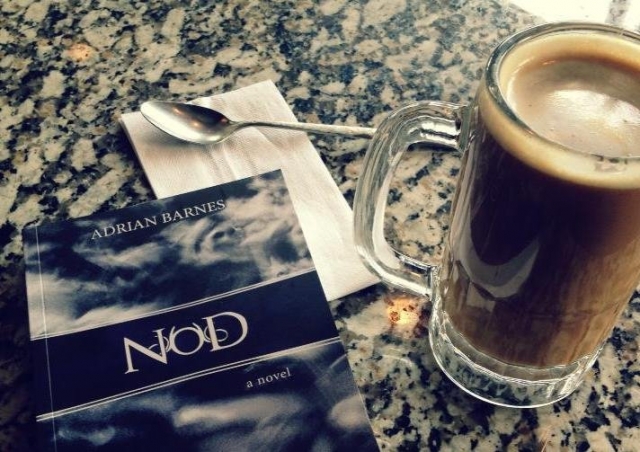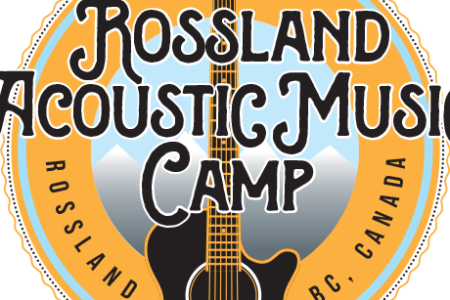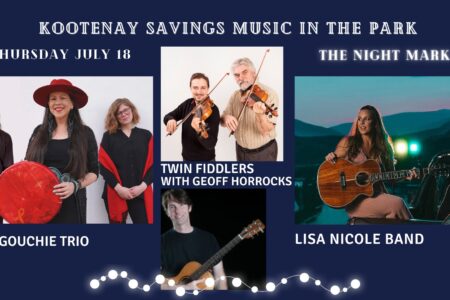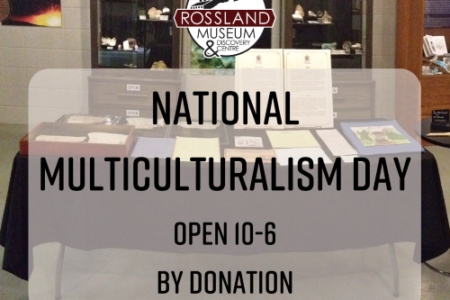REVIEW: NOD—Rossland novelist pens international hit, launches it locally on June 15
One cold, dark night in mid-winter I cracked into Adrian Barnes’ new novel, Nod, not sure what to expect.
(Disclaimer: Adrian Barnes, also the editor and co-owner of the Rossland Telegraph, was brutally arm-twisted into allowing this article to be posted much as I originally wrote it, despite harbouring serious concerns about self-promotion and untold potential damage to his deep-rooted sense of humility.)
I gathered from a cursory look at Nod that the material was dark and heavy: in a word, apocalyptic. And I’m generally one who steers well clear of the Apocalypse, as well as a mortal can. It’s one reason I grow kale. But if this book wasn’t my genre, Adrian was still, after all, my friend and my editor. (A very talented one at that—and I have very little praise that’s reserved for very few editors.) So I went for it.
Wow. I emerged with the book devoured and a bleary gaze as my brain spun to process. It’s a real trip and a half, this book is, a mind-bender, really blow-you-out-of-your-figurative-amniotic-sac kinda stuff.
I couldn’t help but pass it on to my dear mother whose taste in books is, if I may say so, extremely good. I usually leave it to her to tell me what to read, not the other way around. Looking at the book she was skeptical—like myself, dear mama is not a fan of the apocalyptic theme—but she took the book home. A few days later, the verdict: “Amazing. He writes so well,” she said. “It’s really not my genre, but I was pulled right in. I really enjoyed it. I loved his words.”
I agree. And so, apparently, did the judges for the 2013 Arthur C. Clarke Award for Science Fiction, which the Guardian calls “The UK’s preeminent science fiction prize.”
Of 82 nominees, Barnes’ Nod was selected as one of six novels in the shortlist. This is no small feat, and although another novel topped the lot, we’re talking about one of the most prestigious science fiction awards in the world. And right there, smack dab in the heart of the award ceremony about a month ago now, was Rossland’s Adrian Barnes! That should get some local pride glowing away.
I could go on about fascinating Vancouverite characters wrapped into a far-out but somehow totally real plot in which everyone on Earth is plunged into permanent wakefulness and creeping, sleep-deprived insanity.
I could go on about the rich language used to weave a dreamlike state in the reader’s consciousness, drawing us into questions of meaning and existence without taking a moment away from synapse-sparking Hollywood-style action.
I could go on about the symbolism I sensed from Barnes’ choices—an etymologist for the main character, a homeless man turned cult admiral, a vigilante militia struggling to keep up appearances but tumbling into insanity just the same, and silent children banding in a bubble of utopian potential floating on dystopian air.
I could, but I won’t. It wouldn’t serve you to hear my second-hand rendition of what is much better experienced yourself. Get the book off someone, bug the library to stock it, or heck, go out and buy it: you won’t be sorry you did.
Instead, here and now, I’d like to share with you some excerpts from an evening I spent with Adrian as he prepared to head out to the UK for the ACC award ceremony. The conversation ranged widely, from philosophical meanderings into the heart of humanity, to Barnes’ decision to publish in the UK and his experiences looking for a Canadian publisher, to the evolution of Nod, to other long-shelved novels that may yet see the light of day.
Hooking a contract
“It’s hard to publish a novel,” Barnes said. He knows, having written a couple of unpublished ones. “There has to be a hook to get it taken on by a good-sized publisher,” he explained. “My other novels were too interior. The publishers I sent the manuscripts to liked them, but they would say they didn’t know how to market them.”
Based on this feedback, Barnes decided to write Nod as a “concept piece.”
“I thought, if I’m going to write another novel and put the effort into that again, I’m going to come up with a big, movie-like concept, and then try and do my type of writing within that,” he said.
The hook in Nod is pretty clear, “It’s the apocalyptic, end-of-the-world thing,” he said, “in the genre of science fiction movies and novels like 2001: A Space Odyssey, Planet of the Apes, that kind of stuff.”
It was a new, visual approach for Barnes, with key scenes also influenced by “that would be cool” criteria, like when an aircraft carrier crashes on a Vancouver beach, or a sleep-deprived crowd transforms into a seething mess of wild, fantastical, dancing beasts.
Framing the story like a movie seems to have paid off not only in a riveting read, but it also got published right away. Through the recommendation of a literary friend in the UK, the publisher BlueMoose picked up Nod before Barnes’ even had plans to sell the book. “I had an agent, but I hadn’t even mentioned [Nod] yet! Kevin [of BlueMoose] really liked it and got back to me right away with an offer.”
Why England? For one, Barnes explained, it’s a bigger market. It’s also his roots: “I was born in England and I’ve always maintained a lot of English connections. My sense of humour is dark and probably comes through better to English people than Canadians. For me it was a good choice, but now I’m trying to get published in Canada.”
Hollywood is now taking a look and Barnes’ film agent is currently negotiating an option deal with a production company down south.
The unfolding of a sleepless novel
Barnes’ hook was well-crafted, grabbing even anti-apocalypse me, but the key to my reading enjoyment was what he referred to above as “my type of writing.” This is a well-written book.
“Stories are pretty simple things, really,” said Barnes, who teaches creative writing and composition at Selkirk College. “There’s somebody striving and they either get what they want or they don’t get what they want. It’s satisfying when the hero triumphs or sad when there’s a tragic ending. I think we respond to these things because they mirror the stories of our own lives.”
“Stories develop for me over months of conversations,” he explained. “I talked to the boys [sons Liam and Ethan] extensively about the whole thing, plot point by plot point, getting feedback from people, trying to get a resolution that made sense.”
For Barnes, a story’s success hinges on “resolution.” He said, “Usually that’s what lets me down most about modern novels. It’s easy to have a good idea, some compelling characters, and a theme, but more and more I find the novel doesn’t resolve in a satisfying way. I’ll often read a novel that’s 250 pages long, and 230 pages in I’m like, ‘Yeah, this is a great novel,’ and then the last 20 pages it’s like they wrestled it as best as they could to a conclusion, and I end up feeling cheated.”
Beyond plot resolution—and we’ll leave that for you to find out—at the root of Nod is the meaning of words and the way words structure our awareness of reality.
“I’ve always been into old words,” Barnes said, “and at one point it hit me: man, those words sound like they’ve come from some kind of disordered, sleep-deprived mind. And so it became a novel about an etymologist and an insomnia epidemic.”
He also strove for his symbols, themes, and metaphors to find purchase in people’s lives: “I think most people instantly connect to the novel’s big metaphor, sleeplessness,” Barnes said. “Some people know what it’s like to not sleep, and others say, ‘Yeah, that’s what the world’s getting to—it’s a big rush and nobody slows down.'”
“And sleeplessness interested me because I have a hard time sleeping sometimes,” he said. “When you have a problem sleeping, your consciousness does change. If you go three days without sleep, you start to see things out of the corner of your eye and you realize how fragile life is.”
So in the book, he aimed for “dream logic:” “I didn’t want it all thought out,” he said. “I call it ‘thinking metaphorically.’ Nothing is sequential; it’s all a bit of a blur.”
From there, other metaphoric elements took shape, including the silent children: “I always try to pair things and balance them,” he said, “so when the main character is all about words, and in some ways words create many of the problems in the world, it occurred to me that there should be something in the novel that was beyond words.”
It’s another case of dream logic, he explained: “I think there’s a logic to having the Admiral-of-the-Blue, Charles, obsessed with Paul’s manuscript, and trying to live according to this book on weird medieval words, and then children that don’t speak. There’s something there that makes sense, but I wouldn’t be able to explain it and say ‘I did it for this reason.'”
The “weird medieval words” spoke to Barnes about the human condition across eras. “What really struck me about those words is how subjective our constructed reality is.”
He gave “oubliettes” as one example, an old punishment in which people were put in a box and left to die.
“Guantanamo Bay is no different than an oubliette,” Barnes said, “or the way we use slave labour in China. It was Arthur C. Clarke who said the 20th century was the most barbaric in human history. We’re not more civilized than in the past, we’re less.”
“I wanted to draw those connections,” he said. “What we call the modern world is still a pretty brutal place just beneath the surface. That’s why it was important for Charles to be a homeless person. Homeless people live in a very different reality than people who have homes to live in. It’s an entirely different Vancouver if you step over half a block and walk down the alleyways, it’s an entirely different civilization.”
Finding hope in the Apocalypse
As I’ve admitted, I don’t like to dwell on the potential for global calamities. Don’t get me wrong, I see the potential there and it influences my life, but I like to focus my time and effort on the here and now, the solution instead of the problem. And I think most people do.
But we’re also drawn to end-of-the-world scenarios with a macabre magnetism, so I challenged Barnes to defend his dark theme.
“We’ve always had cautionary tales, fairy tales, and things that talk about the dark side,” he began. “And there’s the notion of the purge or the inoculation through the exposure to negative things as well. I think the novel has elements of redemption, elements of love, elements of transcendence with the children and Paul’s dream.”
Creative works play an important role in stretching the imagination too, he said: “The words we use make this world. If we evolve, it’s going to be something we can’t imagine. That’s what those kids represent: a different way of being or a different form of consciousness—without spelling it out, because I don’t know what that would be like.”
“Whatever’s going to be better than this, the world we’ve created and the cities of glass, is necessarily going to be something we’re going to have a hard time imagining,” he said. “I hope there’s hope in the book. Not for this, [the way we live presently], maybe, but hope in the sense that maybe it can turn around.”
He paused. “Although, in all practicality, I don’t think that’s going to happen.”
He continued, “I’ve always been attracted to the dark side, not to be negative, but in order to face it. I think the world’s a pretty dark place. It’s pretty grim. People lead pretty desperate lives. Especially under capitalism where people are driven to consumption with no time for reflection. That’s the main thing I think would cause Nod to happen: the lack of time to process.”
At Selkirk College, first year composition is Barnes’ favourite course to teach. “We talk about that a lot: how does society want you to lead your life? What would really bring value to your life?”
“I’m a big believer that critical thinking brings value to your life, especially in a situation like this where we’re being lied to and assaulted in so many ways,” he said. “You have to make a virtue of criticism, and in a way this novel is a piece of critical thinking.”
“We’re not going to voluntarily change our consciousness,” he said. “We’re not going to stop polluting, or stop fighting wars, or stop being racists, or whatever.”
What we need, he said, is an evolutionary leap.
Apocalyptic porn and the meaning of it all
Barnes definitely took exception to having his novel classified alongside “apocalyptic porn” where Arnold Schwarzenegger and Bruce Willis save the day, muscling their way out the far end dirty, sweaty, and flying an American flag.
“Life is not about entertainment, but our culture would have you believe that: you get a job to earn money so on the weekend you can go out and have some fun. The whole mentality of the culture becomes consumerist in that sense,” Barnes said. “That’s the mindset that creates apathy.”
“That’s a big problem for me: there’s no recognition or dignity given to work. Whereas the happiest people are always working; they just love their work. Sure, when you finish your work you sit down and have a beer or whatever, but our culture has reversed everything.”
“If you envision the weekend with a party, and the food you’re going to eat, and the girl you’re going to meet,” he said, “even if you get it all, two weeks later you’re going to be bored: the girl won’t seem as pretty, the beer won’t taste as good, and so on. It’s a rip off, all the way down the line, it’s fake. It’s a chimera. It disappears.”
“The only thing that lasts is work. It’s things you build,” he said.
“Humans are built for complexity,” Barnes continued. “I don’t think we really like simplicity. The things we conceive of as ‘pleasure’ are usually simple: food, sex, entertainment of some sort–the satiation of appetites. There’s nothing complex about that. Whereas developing a skill, challenging yourself physically or mentally, creatively, those are the things that really work for us.”
“But consumption is anti-complexity,” he said. “And the fact that consuming doesn’t satisfy just makes you think you need more…”
Adrian Barnes will be launching his new novel, Nod, at Cafe Books on Saturday, June 15 at 7pm where he’ll be reading and answering questions about his new book. Admission is free and copies of the book will be for sale. Check it out on facebook…


























